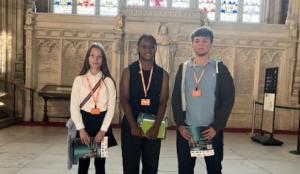Over the last four years as Children’s Commissioner I’ve heard from a million young people about the issues that are most important in their lives. Without fail, they talk to me about the importance of getting a great education, and about what they are learning in school. Many have also spoken to me about the skills they want into adulthood, such as knowledge about finances as well as core subjects of reading and numeracy.
My Youth Ambassadors have had the chance to share their views about what they are learning at school with the Education Minister Stephen Morgan and have also spoken in detail to Professor Becky Francis who is leading the government’s ongoing curriculum and assessment review. Their views have helped shape and influence the review’s findings, due to be published in the Autumn.
Listening to young people’s voices and views is not only insightful, but also essential if we are to make policies that reflect what families and communities need.
The Youth Shadow Panel was established with that in mind by a coalition of young people and leading youth organisations to shadow the Government’s curriculum review. As part of this process, the Panel has included the views of young people and organised its own call for evidence as well as holding a series of roadshows.
Last month three of my Youth Ambassadors – Violet, Chan and Anthony – went to the Parliamentary launch of the Youth Shadow Panel’s Curriculum Review final report. It set out 14 key recommendations across four themes: building skills and relevance to life; assessments, mental health and wellbeing; climate, sustainability and citizenship education; and equity and inclusion.
Here, the Ambassadors share some of their reflections and views on the event and the report’s proposals.
Anthony: “I was really intrigued by how much the Youth Shadow Panel agreed with my opinions about the education system. The panel shared their view that [for many young people] exams cause unnecessary stress and mental effects, while also not showing the true capabilities or knowledge of a child, and that coursework-style tests are a more progressive method. In this way, our children will be engaged with the curriculum throughout the whole school year, in less tense conditions, rather than everything leading up to a short period of a few weeks. I was pleased to see that the panel explored this issue thoughtfully.”
Chan: “One thing I found surprising was that I’m not the only young person who struggles with the school system. What stood out to me was how the curriculum really needs to change. I also realised that the school system prepares the children who are very academically smart for the future but not the ones who struggle with school and learning. Schools prepare students academically and don’t give them life skills. I really like what one of the speakers said: “The youth of today will be the leaders of tomorrow.”
“What needs to happen in the future? Schools must be inclusive for all students and for children with SEND to be supported within the school system from reception to year 13. Children have a right to a good education. I would like schools to understand that instead of ignoring the needs of some children, [and] the curriculum needs changing and to be kept up to date. Schools should not do so much assessment of learning but focus on assessment for learning. [I’d like to see them] cut down the amount of assessment [overall. We need to] follow the science. Children sitting at desks all day is not working.”
Violet: “[I think the Youth Shadow Panel’s proposal on] building skills and relevance to life is excellent. We are coached through exams but not taught how to live our lives as adults. Especially if you do not have parents or guardians who do not pass on the skills. My school offers an excellent enrichment program which I have taken advantage of, however, some opportunities have been limited because of cost. Everyone should be offered this.
“For me personally I am particularly interested in the lack of political literacy. How can we expect people to make an informed voting choice when they are taught nothing about the system? I agree [with the Panel that] the length and number of exams and GCSE should be reduced as the workload is too high. We need to make these exams “smarter’, it should not just be a test of memory. I also agree that there should be more coursework for this reason as well.




